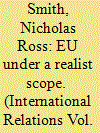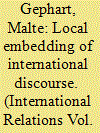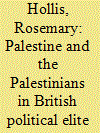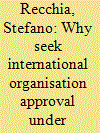| Srl | Item |
| 1 |
ID:
144077


|
|
|
|
|
| Summary/Abstract |
This article breaks from the dominant liberal-idealist literature and examines the European Union’s (EU) foreign policy decisions from a realist perspective. Through employing a novel, EU-focussed neoclassical realist framework, the EU’s offer of a Deep and Comprehensive Free Trade Agreement (DCFTA) to Ukraine is argued as being a result of the mediating influence of its normative power role identity, the (mis)perceptions held by its foreign policy decision-makers and the institutional constraints inherent to its foreign policy decision-making process, which filtered systemic pressures (emanating from the European geopolitical setting) into the final foreign policy decision. Thereafter, this article assesses the EU’s responses to the Ukraine crisis, offering policy reflections and recommendations.
|
|
|
|
|
|
|
|
|
|
|
|
|
|
|
|
| 2 |
ID:
144078


|
|
|
|
|
| Summary/Abstract |
The international and transnational anti-corruption campaign (ITACC) has successfully called global attention to the ‘abuse of delegated power for private gain’. However, several anti-corruption scholars have argued that the currently dominant ITACC is flawed because it ignores the fact that local understandings of corruption vary around the world. Others who have analysed the ITACC have claimed it is capable of effectively covering up these differences, in turn creating misunderstandings about the aims in the fight against corruption. While both arguments have been developed quite separately, this article combines and thereby advances both. It applies constructionist interviews and argumentative discourse analysis (ADA) to explore the local anti-corruption discourse in Chile – a country that is considered a success case in Latin America. The exploration shows that Chile’s anti-corruption activities are highly political and they are deeply related to narratives of the country’s transition to democracy. By relating these narratives back to the ITACC, the article reveals a complex interplay between local (competing) corruption narratives and the ITACC.
|
|
|
|
|
|
|
|
|
|
|
|
|
|
|
|
| 3 |
ID:
144076


|
|
|
|
|
| Summary/Abstract |
This article examines how the Palestinians have been represented in British political elite discourse between 1915 and 2015 as an exploration into the role of such discourse in framing the identity and thence shaping the fate of a community or people seeking national independence. It also makes some observations about the significance of political violence or war in bringing about paradigm shifts in the discourse. The analysis reveals that the way the British depicted the Palestinian Arabs and their cause has changed over time, but at no point did the discourse identify independent statehood for the Palestinians as a central or stand-alone objective of policy.
|
|
|
|
|
|
|
|
|
|
|
|
|
|
|
|
| 4 |
ID:
144080


|
|
|
|
|
| Summary/Abstract |
The use of torture by the Bush administration has raised important questions regarding the strength of the torture taboo. Did US torture signal a regress of the torture prohibition? This article examines the attempts by the United States to re-define torture to better reflect its interests. However, rather than seeing this as a case of norm regression, I show how the United States failed in its revisionist attempts to legitimise its interpretation of torture in international society. The torture taboo remained resilient to US challenges, demonstrating not only the difficulty of norm revisionism but also the robustness of the torture taboo.
|
|
|
|
|
|
|
|
|
|
|
|
|
|
|
|
| 5 |
ID:
144079


|
|
|
|
|
| Summary/Abstract |
What motivates the United States, the world’s most powerful country, to seek multilateral approval from the United Nations or NATO for its military interventions? Drawing on interviews with top-level US policymakers and combining process tracing with a structured-focused comparison of several cases, this article reveals that American leaders do not value multilateral approval primarily to avert negative issue linkage, or ‘soft balancing’ in other policy domains. Instead, they are motivated by narrower concerns. Their main goal is to facilitate sustained military and financial burden sharing on the prospective intervention, in the expectation that this will assuage congressional concerns about resource costs, reducing the risk that Congress might withdraw its support once American troops are deployed. The article therefore demonstrates that (1) US policymakers worry less about issue linkage than many International Relations theorists, as policymakers are confident that overall, US power inclines other countries to bandwagon with the United States, and (2) contrary to widespread belief, executive-branch concerns about congressional opposition do significantly influence US military intervention decision-making.
|
|
|
|
|
|
|
|
|
|
|
|
|
|
|
|